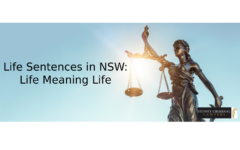Life Imprisonment Without Parole: Is It Ever in the Interests of the Community?

The sentencing of 33-year old Justin Laurens Stein to life in prison without parole for the January 2022 murder of 9-year old schoolgirl Charlise Mutton at Stein’s family home at Mount Wilson in the New South Wales Blue Mountains has been welcomed by the mainstream media and most segments of the community.
But others have questioned whether such a severe punishment is ever truly warranted, asserting that it represents cruel and inhumane punishment, discourages rehabilitation behind prison walls, potentially impacts on the maintenance of a positive prison environment and can unnecessarily cost millions of additional taxpayer dollars – in circumstances where even a person who has committed such a heinous crime might eventually be rehabilitated – albeit in decades.
Life Means Life in New South Wales
Ever since 1985 by which time all Australian states and territories had abolished the death penalty, life imprisonment without parole has been the most serious sanction under criminal law.
And it is important to be aware that since 1999 in New South Wales, a life sentence means just that – a person is sentenced to spend his or her entire natural life behind bars.
The 1999 ‘life meaning life’ reforms were a response to public outrage that the average time spent behind bars by a person sentenced to life in prison was 13 years before.
And although a non-parole period may still be set for a life sentence (commonly 25 years) and sentences can in very limited circumstances be commuted, revoked or attract pardons, a person who is sentenced to life imprisonment without a non-parole period being set can expect to remain in prison until his or her death.
Such a harsh sentence has been considered by some as a breach of fundamental human rights, namely a ‘cruel and inhumane punishment’, and potentially against the interests of the community as it not only costs a great deal of money to imprison a person for that long, an inmate without hope can cause issues within prison communities, including interfere with the rehabilitation of others.
But others are of the view there are some particularly heinous offenders who are so dangerous to the community they should never see the light of day. Proponents of life meaning life sentences also assert that the prison system is well-placed to deal with, isolate from other inmates and, if necessary, sanction such persons into submission.
And in the case of Justin Laruens Stein, whose case was recently finalised in the Supreme Court of New South Wales, many have welcomed the sentence of life imprisonment without parole.
An Horrific Murder
Justin Laurens Stein was found guilty of murdering Charlise Mutton, a 9-year-old girl, in her Mount Wilson home just west of Sydney in January 2022. Stein shot Charlise twice, killing her, and then placed her body in a plastic barrel. He then dumped the barrel near the Colo River.
Stein was found guilty of murder and has been given the maximum sentence of life in prison without parole.
The Initial Offence
Justin Laurens Stein shot nine-year-old Charlise Mutton with a rifle in the back and of the head from only 30 centimetres away, using an ‘execution’ style shot on the innocent child. Stein accused Kallista Mutton, Charlise’s mom — and his ex-fiancee — of murdering her daughter.
However, the NSW Supreme Court, led by Justice Wilson, didn’t believe Stein’s story.
“”Having murdered a nine-year-old girl, all the offender’s energy was spent covering his tracks and directing blame elsewhere. Some instances of murder are so grave that the maximum penalty is the only appropriate penalty.”
Justice Wilson used Stein’s words, evidence, and apathy to reach the sentencing of life in prison without parole. She noted that he was very ‘calculated’ and’ completely dry-eyed’ while recounting the incident.
On the other side of the coin, the defence lawyer, Carolyn Davenport SC, argued that sending Stein to prison for a life sentence is ‘cruel and unusual’. However, given the grave nature of the crime and the heinous acts, Justice Wilson rejected the complaint.
After shooting and killing Charlise with the rifle, Stein drove three hours to Sydney wharves to discard the body. He found a remote location near the banks of the Colo River and dumped the body in a barrel filled with bags of sand to weigh it down.
Overall, Justice Wilson took into account the victim’s age, Stein’s lack of remorse, and lack of potential rehabilitation as reasons for why she handed out the sentence of life in prison without parole.
Mandatory Life Sentences in New South Wales
Section 61 of the Crimes (Sentencing Procedure) Act 1999 (NSW) (‘the CSPA Act’) requires a court to impose a life sentence on a person who is convicted of murder if satisfied that the level of culpability in the commission of the offence is so extreme that the community interest in retribution, punishment, community protection and deterrence can only be met through the imposition of that sentence.
The section further stipulates that life sentence must be imposed on a person who is convicted of a serious heroin or cocaine trafficking offence if the court is satisfied that the level of culpability in the commission of the offence is so extreme that the community interest in retribution, punishment, community protection and deterrence can only be met through the imposition of that sentence and the court is also satisfied that:
- The offence involved a high degree of planning and organisation, and the use of other people acting at the direction of the person convicted of the offence in the commission of the offence, and
- the person was solely or principally responsible for planning, organising and financing the offence, and the heroin or cocaine was of a high degree of purity, and the person committed the offence solely for financial reward.
A ‘serious heroin or cocaine trafficking offence’ is one which involves the supply of at least the commercial quantity of the drug.
The section makes clear that the court retains the power under section 21 of the CSPA Act to impose a lesser sentence if it sees fit.
Statistics suggest that the majority of offenders in NSW who are serving a life sentence without parole are murderers, followed by attempted murderers and serious sexual offenders.







